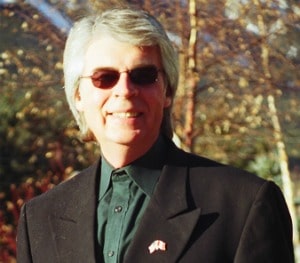
All predictions for end-of-the-world scenarios foisted on the population over the years by some or other credulous cult have been false. I say that with certainty and relief as…we’re still here! A new year’s article about radio, however, would not be complete without a tentative prediction. Here’s one: Radio will continue to be so seriously pooched!
Now, that might be a little hysterical on my part. Possibly a result of too many feast remnants and dancing visions of sugar plums. Yet, in addressing the prediction — like a hot air balloon that rises only because of the flame in the burner — radio, if we check the gauge, is running low on fuel. Maintaining altitude, never mind gaining altitude, is becoming much more difficult. Some outfits are already skirting treetops and skimming over church spires, transmission lines, and AM towers. Pilots are exhausted and flying under duress. They have to land, reassess, make repairs, and gas up. And they must do so quickly – or else.
“C’est la vie,” say the French. “That’s life,” croons Frank. “%$#@ happens,” from Confucius, despite the accent. These are keen observations, to be sure. But existential blurts will not provide radio any protection from harsher, oncoming realities and inevitable consequences.
Although I have always been prepared to deliver serious and powerful new content and processes, I was t-boned some time ago by my realization of the extraordinary reticence displayed by radio’s owners and leadership to accept the necessity of making drastic improvements to the most fundamental of our communication models.
Meanwhile, commercial radio continues to be at the largesse and whims of some major advertising categories. Fortunate it is for radio that many of these advertisers are more aware of the capacities of radio to deliver than even the radio ownerships themselves. I wait to meet an owner or manager who can even describe how, specifically, radio works! Good thing local advertisers don’t ask. Still, it is those local advertisers that radio must be attracting, particularly those stations that do not warrant buys from the majors.
My education and experience — over many decades — compel me to steadfastly maintain that radio’s main flaw is its failure (or refusal) to acquire and apply the necessary, fundamental communicative elements consistent with the medium. All these elements are supported by three main, critical tenets, necessary for developing more influential radio in the future.
Further, and as a more reasoned prediction for the New Year, I can posit: Those radio stations that do not go through a process of revamping their on-air and commercial writing and production approaches will make no serious advancements. Many are more likely to continue losing business.
The three main posts on which the whole linguistic platform is built make up a base structure. They are not the totality of the program, but are the solid foundations on which to branch out on a discovery of more meaningful, listenable, influential, and available strategies and methodologies. The benefits of making such improvements are multiple: audiences listening longer and more often, better audience responses to locally-produced commercials, greater, more enthusiastic participation from station staffs and, as a bonus, serious difficulties for competing stations to replicate the improvements.
I will rehearse those three main tenets here – providing another opportunity for ownership and management to consider them once again, and to speculate on the possibilities of significant improvement of their outfits through the implementation of the methodologies.
Before spreading them out again, let me acknowledge that I understand how goading and jerking radio’s owners and managers around is hardly a preferred strategy for getting their attention or for building rapport or credibility. I learned this during a visit to the Calgary Zoo. We were witness to a visitor grabbing a birch branch and pushing it through the bars of the cage to poke a bear in the balls. Nothing good came of it. In fact, roaring at peak db, the enraged bear instantly charged, explosively clanging into the bars, whereupon our zoo visitor, terrified and frozen on the spot, had a massive and impressive trouser incident.
Here then, are the foundational tenets that impact the on-air and commercial production portions of every radio station. (For anybody who “gets” this, doors will be thrown open and ways will be revealed.)
- Radio is an indirect medium, (it’s in all the papers), and works so much better and efficiently when delivered as such. There are no direct connections made between any radio speaker and any individual or group making up an audience at any particular time. “One-to-one,” therefore, is a ridiculous concept and an example of poisonous programming. The struggle to be “personal” on the radio is a singularly toxic activity. Alternatives are available.
- Radio has no authority. Radio hasn’t accepted that. I know this because on-air folk and commercial readers are constantly making demands for behaviors – telling audiences what to do. Bad approach. Alternatives are available.
- Human beings represent their experiences of the world in sensory terms, internally and externally. They hear, they see, they feel, they taste, they smell, and they derive meaning from all those elements. (The last bit we like to call “thinking.”) Radio people do not purposely express themselves in sensory terms, thus failing to exploit those deliciously powerful facets of listeners’ experience.
How else, I wonder, is a radio station to do a better job of anything until or unless it makes a significant effort to improve its most important services, namely, the on-air presentations and the quality of locally produced commercials?
Further, I do doff my hat to the account executives. I marvel at how well some sales people can do, particularly since they are going to the street with such tawdry products. Maybe they throw large chunks of raw meat into where their prospective advertisers are doing business. Given my own questionable and foul approach, my task may be to find bears that don’t mind being poked in the balls.






To be sure, Buzz. Even the guy running a local cab stand will agree that local productions of radio commercials suck large. The circumstance is akin to having a massive, steaming, olfactory-destroying turd in the middle of the station’s foyer – that everybody walks around.
My invitation to you was about considering the 3 main posts that support a completely different model-of-communications for radio.
If you wish to respond in privacy, I am at [email protected]
My suspicion is that, like most programmers, you would be very uncomfortable with those propositions.
Almost everybody is.
Ron
You are so right regarding the importance of quality commercial content! Vital
Cheers and Happy New Year